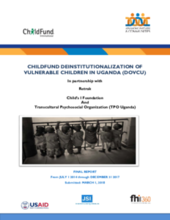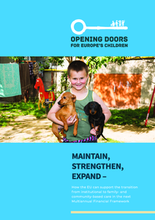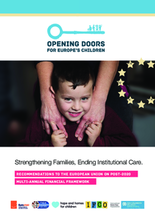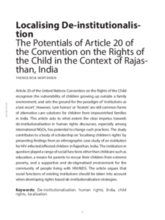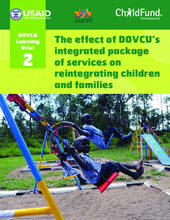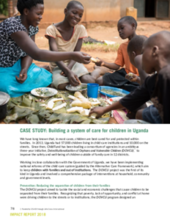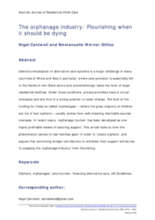Displaying 261 - 270 of 691
This final report on the “Deinstitutionalization of Vulnerable Children in Uganda” (DOVCU) project identifies its successes as well as some shortcomings and key learning that is directly relevant to other projects working to support family care for children.
This publication from Opening Doors for Europe's Children calls upon the EU to maintain, strengthen and expand the use of funds so they make a greater impact and go further to eliminate institutions for children across Europe and beyond.
This article reports the findings of a multi-country study of medical professionals' perceptions and evaluations of children in three Eastern European countries (Romania, Bulgaria, Moldova).
This report from Opening Doors for Europe's Children presents recommendations to the EU on how best to include deinstitutionalization and children's care as a part of the next multiannual financial framework.
The 2017 country factsheets provide an update on the status of child protection and care reforms from 16 European countries that are the focus of Opening Doors for Europe’s Children campaign in Phase II.
This study contributes to a body of scholarship on ‘localising children’s rights’ by presenting findings from an ethnographic case study of an institution for HIV-infected/affected children in Rajasthan, India.
This learning brief analyzes quantitative data from the second of the “Deinstitutionalization of Orphans and Vulnerable Children in Uganda” (DOVCU) project’s stated objectives: examining the extent to which DOVCU project interventions decrease vulnerabilities for reintegrating children and their families.
This case study from ChildFund's 2018 Impact Report describes the Deinstitutionalization of Orphans and Vulnerable Children (DOVCU) initiative in Uganda, which aims to to improve the safety and well-being of children outside of family care.
This article focuses on the study of current transformation processes occurring in Ukraine in the provision of social services to various groups of children, in particular orphan children and children deprived of parental care.
This article looks at how the orphanage industry serves to tear families apart in order to ‘create orphans’, and argues that convincing foreign contributors to withdraw their support will be key to stopping the ‘orphanage industry’ from flourishing.

